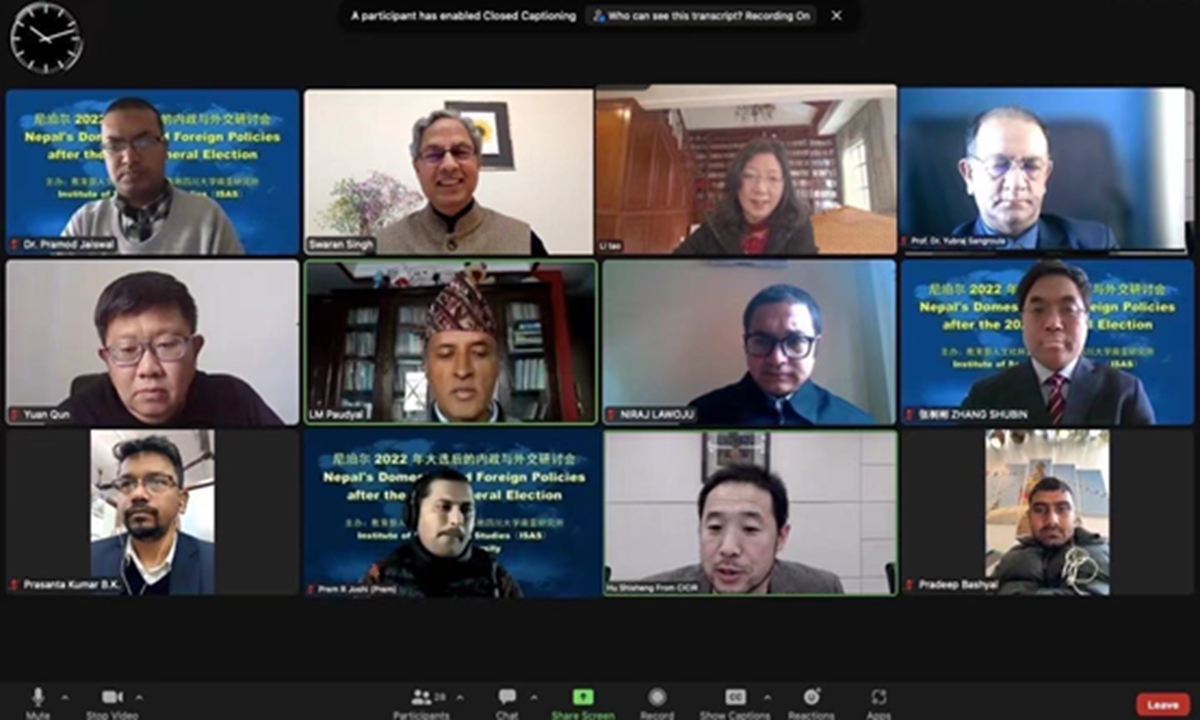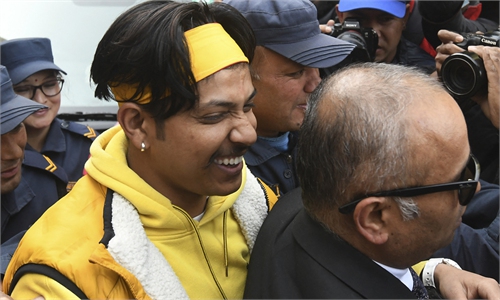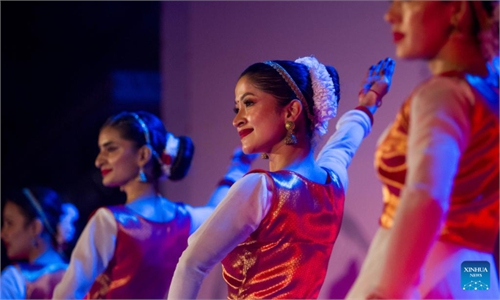
Screenshot of the online conference on Nepal's domestic and foreign policies after the 2022 general election on Thursday. Photo: Courtesy of the Institute of South Asian Studies at Sichuan University
Western politicians and some Indian intellectuals have been criticizing China's investment in developing countries including that of Nepal, as debt trap. This narrative is "closely linked with the 'China threat theory,'" and "the facts reveal differently," Leela Mani Paudyal, former ambassador of Nepal to China and chief secretary of government of Nepal, said on Thursday at a seminar organized by a Chinese think tank. At the end of his presentation entitled "Is BRI an opportunity or a debt trap to Nepal?" Paudyal advised "Nepali politicians, intellectuals, media and top brass bureaucrats should look China from Nepalese eyes not from others eyes."
A virtual seminar on Nepal's domestic and foreign policies after the 2022 general election was hosted by the Institute of South Asian Studies at Sichuan University on Thursday afternoon of Beijing time. Some Nepali officials, as well as scholars from China, Nepal and India delivered presentations at the seminar.
"Nepal can benefit a lot and achieve prosperity from keeping balance between China's Belt and Road Initiative and the US' MCC as well as India's Neighborhood First. Nepal should be a platform for win-win cooperation instead of an arena of major powers' competition," noted Zhang Shubin, director of the Nepal Study Center of Hebei University of Economics and Business.
According to Kalyan Raj Sharma, chairman of the Nepal-China Friendship Forum, "senior US officials' [recent] repeated visits could be an effort to further pressure Nepal's new administration into surrendering to American influence. This demonstrates that the US is concerned about Nepal's potential ideological trajectory."
"The challenges before the newly elected government are formidable both in terms of connecting the electoral politics of the federal provinces with foreign policy, and also involving the stakeholders from the provinces in the national decision-making process," said Mahendra P. Lama, professor of the School of International Studies at Jawaharlal Nehru University.
"Recent years of heightened tensions of Sino-US or Sino-India relations have complicated Nepal's time tested policy of ensuring 'balance' in its engagement with major powers. In that light, the Prachanda government, for instance, has to show that balance in implementing China's BRI and India's Agnipath scheme of the short term recruitment of Nepalese into Indian army," according to Swaran Singh, professor of diplomacy and disarmament at Jawaharlal Nehru University (New Delhi) currently visiting professor with University of British Columbia (Vancouver). Singh continued that "Prachanda [Pushpa Kamal Dahal] has been at the apex of Nepal's politics for a long time and should be able to engage India and China without playing one against the other."
Pushpa Kamal Dahal, chairman of the Communist Party of Nepal (Maoist Center), also known as Prachanda, who had previously served twice as prime minister, was sworn in on December 26 2022. No single party won a majority of seats in the lower house in the November 20 general elections.
Chinese foreign ministry said on December 26, 2022 that "We stand ready to work with the new Nepalese government to expand and deepen friendly exchange and cooperation across the board, pursue high-quality Belt and Road cooperation, inject new impetus into our strategic cooperative partnership featuring ever-lasting friendship for development and prosperity and deliver more benefits for our two peoples."


